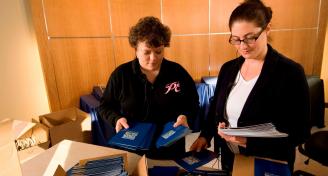Current Events: The Value of Government Meetings
A new bill before Congress (H.R. 2643, introduced by a suburban Philadelphia representative) could have dramatic implications for the travel industry. The "Cut the Waste, Stay in Place Act of 2013” aims to reduce government agency travel by as much as 50% by 2017.
The Value of Government Meetings
The US Travel Association recently released "The Value of Government Meetings" report, a comprehensive study of the benefits of government meetings and events. This report is the first to evaluate the economic impact of the existing sweeping cuts that have already been made to federal and state government travel budgets. Jon Gray, vice president of research & insight, Rockport Analytics, LLC, who conducted the 2013 study says "Public agencies at all levels of U.S. government have made deep cuts to travel and meetings budgets in recent years. Our research found that these across-the-board cancellations offer short-term savings at a much greater long-term cost."
Some key report findings from the private sector perspective include:
- Nearly three-quarters (74%) of private-sector executives agreed that meetings and conferences where government employees were present added value to their firm through knowledge transfer.
- More than four-in-ten executives (43%) reported that meetings and conferences where government employees were present allowed them access to knowledge not available anywhere else.
- Among the private-sector executives surveyed, a majority (62%) reported that spending on meetings and conferences where government employees were present had a positive return, while very few (12%) felt the return on investment was negative.
From a cost perspective, the study found that “spending on government meetings and conference operations was significantly lower than that of the private sector – $173 per delegate, per day on average compared to $339 for the private sector.”
Economic Impact
Based on analyzing other studies conducted in recent years, this study estimates that total spending on government meetings was approximately $17.9 billion in 2011, while private sector spending was about 13 times more at $228.8 billion. The $17.9 billion spent on meetings represents 0.2% of all government spending.
The study found that “government travel for meetings and conferences delivers a broad economic impact and supports thousands of jobs.”
- Government travel for meetings and conferences had a total economic impact of $24.4 billion in 2011.
- Each government-meeting delegate generated roughly $174 in tax receipts, $78 of which went to state and local authorities.
- In 2011, government travel for meetings and conferences supported $14.5 billion in U.S. wages and contributed $5.5 billion in tax revenue.
- Government meeting and conference spending is critical to a number of job sectors. In 2011, government travel directly supported 179,800 jobs, including:
- 58,700 food services and restaurant jobs in the U.S.
- 48,400 hotel jobs
- 31,500 meeting management support jobs;
- 17,800 jobs in ground passenger transportation
- 5,800 airline jobs
- 1,100 jobs in software, audio, and video media
- 16,500 jobs in other industries including automotive rental and leasing, office services, business support services, and equipment rental
Our Take
While cutting the waste is an idea we can all get on board with, it must be accompanied by a clearly defined strategy and a complete analysis of how a bill like this could have unintentional consequences for local economies that rely heavily on travel dollars and private corporations that rely on knowledge transfer to be successful. There has to be a middle ground between mechanisms that do prevent waste, fraud, and excessive spending and allowing for government travel and meetings that have documented value.




